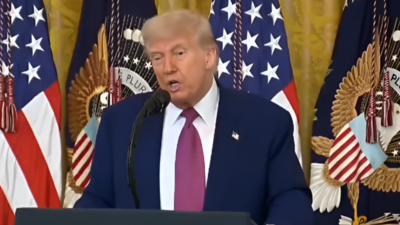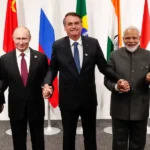In a controversial remark, former U.S. President Donald Trump questioned global attitudes toward World War II nations, saying “everybody hates Russia but loves Germany and Japan.” The comment came during conversations with French President Macron and Russian President Putin.
In a statement that has sparked widespread debate, former U.S. President Donald Trump reflected on the outcome of World War II, expressing bewilderment at the global perception of former Axis and Allied powers. Speaking about his discussions with French President Emmanuel Macron and Russian President Vladimir Putin, Trump commented, “Everybody hates Russia, but loves Germany and Japan. It’s a strange world.”

Image source:-timesofindia.indiatimes.
Trump’s remark, made during an interview and echoed at a recent campaign event, touches upon a sensitive historical nerve. He questioned why, despite being on the winning side of the war, Russia is viewed with more suspicion and criticism globally compared to Germany and Japan, who were defeated and later rebuilt with significant Western aid and cooperation.
The statement has drawn mixed reactions. Supporters praise Trump for voicing uncomfortable truths and questioning Western double standards, while critics accuse him of oversimplifying geopolitics and undermining alliances forged over decades.
During World War II, the Soviet Union played a critical role in the defeat of Nazi Germany, suffering millions of casualties. However, the Cold War era and subsequent political tensions between the West and Russia have greatly influenced post-war narratives and perceptions. Meanwhile, Germany and Japan have transformed into major economic powers and strategic allies of the West, further distancing their modern identities from their wartime histories.
Trump’s comments come amid ongoing discussions about NATO dynamics, Western foreign policy, and the Russia-Ukraine conflict. His comparison may be seen as part of his broader skepticism toward traditional U.S. alliances and international policy stances.
Analysts say Trump’s choice to highlight the irony in current global sympathies underscores his populist messaging, which often challenges historical conventions and institutional diplomacy. While such remarks resonate with a segment of his base, they also risk alienating international partners and fueling diplomatic controversy.
This isn’t the first time Trump has stirred global discussion with statements about World War II and global politics. From questioning NATO contributions to criticizing past U.S. foreign policies, Trump has maintained an unorthodox and often provocative stance on global history and diplomacy.
As Trump continues to campaign for a potential return to the White House in the 2024 U.S. elections, such comments may become more frequent — raising questions about how historical memory, global alliances, and national interests are interpreted in modern geopolitics.














